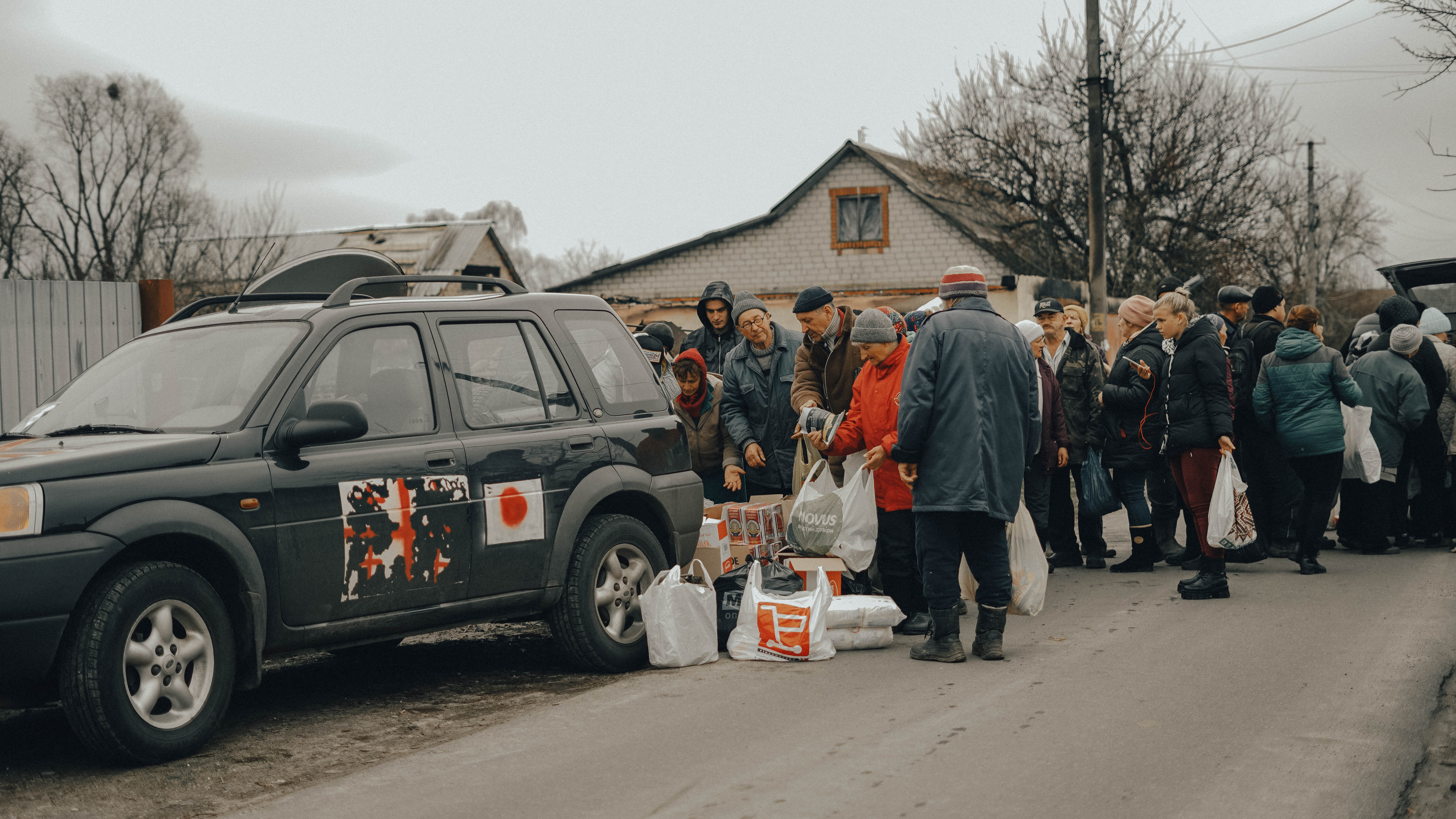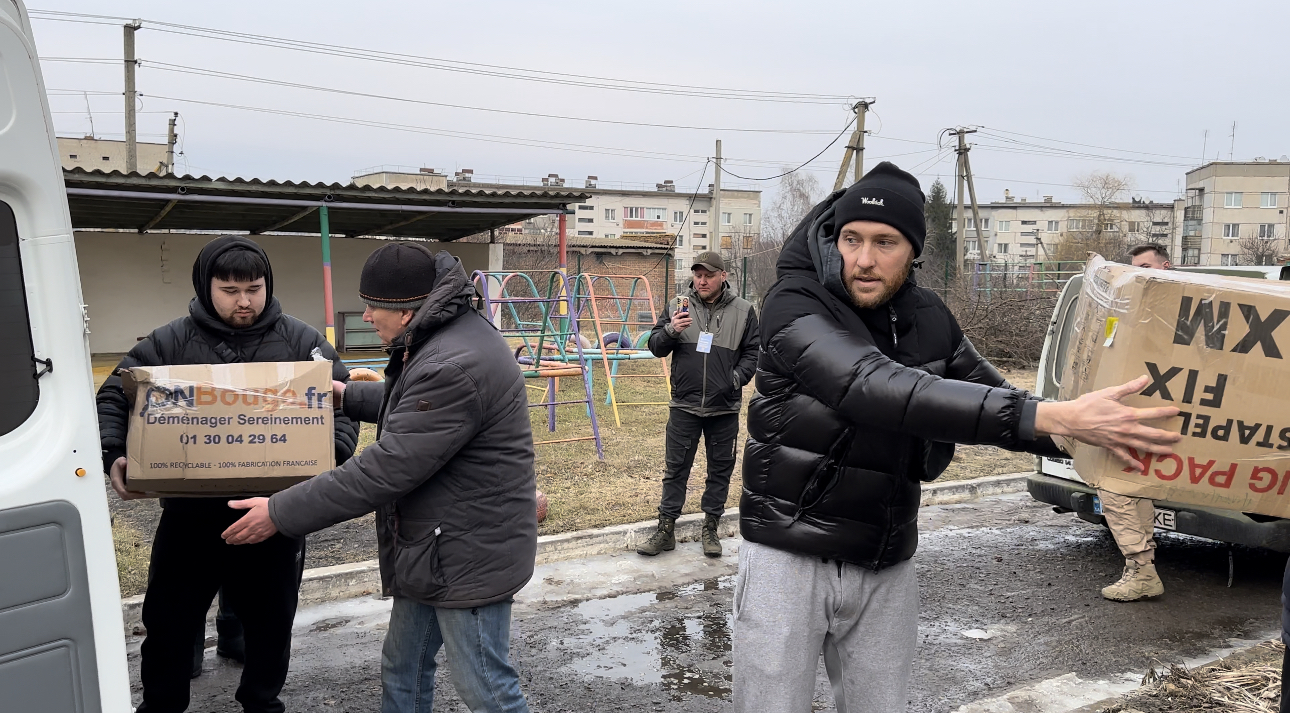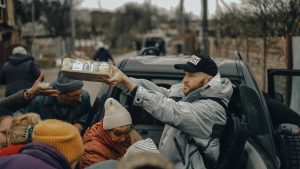The dehumanizing brutality of war amplifies even the simplest joys – a piece of candy, a cup of hot soup, something to warm your hands in the cold darkness. Robbed of their security, their sovereignty violated, and subject to ongoing murderous assaults, Ukrainian civilians have been living under Russian attack for more than 15 months.
Since Russia’s full-scale invasion began in February 2022, the United Nations Refugee Agency estimates that more than 13 million Ukrainians have been displaced. But even during a war, there are moments of normalcy and expressions of kindness and compassion.
For an unknown number of ordinary Ukrainians – mothers and fathers, children, grandparents, teachers, office workers, as well as those who have been forced to defend their homeland as soldiers – those moments of normalcy and relief have come unexpectedly. Some of them come from Japanese civil society, which has been sending a steady stream of relief supplies and money.
The conduit for this aid is a small group of Ukrainian civilians led by Kyiv resident Bogdan Parkhomenko, who was born in Dnipro but grew up in Japan after his mother sought refuge following the 1986 Chernobyl nuclear disaster. In 1999, his brother Stephan was born in Osaka. In 2017 Parkhomenko worked for a Japanese company in Nagoya, before starting his own firm importing health and beauty products from Japan to Ukraine. In the early days after Russia’s invasion, Parkhomenko was a frequent commentator from Kyiv for Japanese media.
As the need for humanitarian aid grew, Japanese citizens continued to send Parkhomenko goods and money, asking him to share with those in need. Together with his brother, mother, and several friends, their small group, informally called Bogdan Team, began distributing donations to elderly neighbors, children who had lost their parents, and pet owners.
What started as a part-time volunteer operation run from his Kyiv apartment grew into a full-time job. Parkhomenko and Bogdan Team continued to collect, sort, and deliver donated food items, medicine, household and personal care goods, including soap, diapers, toys, coffee, tea, snacks, and sweets, which boost morale to a population under constant stress for more than a year.
Gradually, they began helping soldiers who are especially fond of instant noodles and soup. Disposable hand warmers and fever reducing pads, as well as moist wipes that cool and clean skin when bathing is impossible, are also popular items. Other donated items include mobile batteries, lanterns, tactical mats, thermal imaging gear, helmets, and gasoline. Bogdan Team has also donated civilian grade drones and a car fortified for military use.
The team’s work takes them to some of Ukraine’s most dangerous areas, from Chernihiv in the north to Odesa and Kherson in the south to Bakhmut in the eastern Donbas region.
In addition to distributing aid, Parkhomenko has been working remotely with a Japanese crew to produce a documentary for broadcaster NHK. The film, which is set to air in Japan on May 20, will examine nuclear weapons, technology, and blackmail in Ukraine. Filming took Parkhomenko and his team to Kharkiv and Kupyansk near the Russian border. While there, they delivered 80 boxes of supplies to a region that was closed by an increase in attacks soon after their visit. In April, Bogdan Team supplied around 120 families with an estimated two tons of food to eastern Ukraine, just 8 kilometers from the Russian border.

Bogdan Team distributing supplies in Chernigiv. Photo by Vladyslava Lazarenko.
Parkhomenko explained that when the team travels to the most besieged areas, they leave their car half full so they can help evacuate civilians. While in Kharkiv, they collaborated with a local volunteer group that claims to have evacuated 30,000 people — roughly a hundred per day — since the invasion.
Parkhomenko said monthly monetary donations from thousands of Japanese “super fans” have allowed them to buy supplies in Kyiv for distribution where they are needed most. Contrary to popular opinion, he said, certain items are still available, but prices are high.
Logistically, it can be easier to buy some goods for donation in Kyiv, but Parkhmenko understands Japanese are proud of their products and enjoy seeing them delivered to Ukrainians in need. He’s grateful for the ongoing support and the chance to introduce Japanese food culture to Ukraine.
By marking donations with Japanese flags and Bogdan Team stickers and posting their work on social media, the team helps Japanese donors feel a sense of connection and appreciation, while building goodwill between Ukraine and Japan.
Unlike large international aid agencies, Bogdan Team has no legal status, allowing them to give to anyone who expresses need without registration or requiring government ID. The team’s informal volunteerism, unfettered by bureaucracy, is nimble and more flexible to offer direct help on short notice. Parkhomenko said he will continue this work as long as Japanese or other like-minded donors send aid.
Parkhomenko pointed out that his name, Bogdan, means “god’s gift.”
At some point, he says, the war will end and he can move on. Parkhomenko is already considering developing an IT company or a civilian security service. For now, he would just like to have a break and rest. Unable to travel, he dreams of spending a week at the beach relaxing. He mentions Odesa, famous for its coastline, but that coastline is now littered with landmines.
Speaking by video call just hours after the first Russian airstrikes on Kyiv in almost two months, Parkhomenko admitted the war has taken a mental and physical toll. He knows an air raid siren could come at any moment. “The situation is not happy but we’re trying to find a new way of life.”
He conceded the work his team does is dangerous, adding, “but you know, living here is dangerous.”
Despite the war, Parkhomenko says, life goes on in Kyiv. People still go to work but he said, “we also have missile attacks… this is still a big problem.”
Then calmly, with resolve, he added, “We are going to win this war.”

Bogdan Team distributing donated supplies in Ukraine. Photo courtesy of Bogdan Team.
































